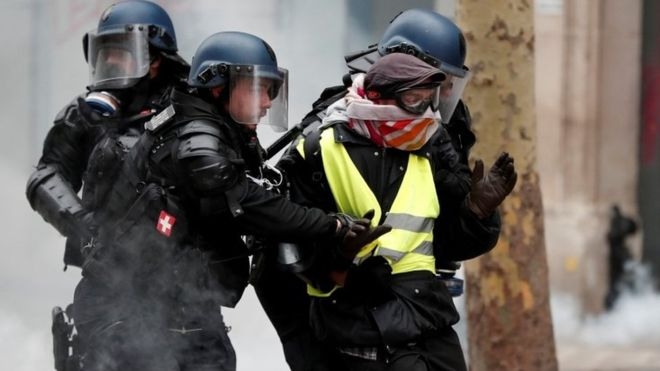French PM seeks 'unity' after new unrest

French Prime Minister Édouard Philippe has vowed to "restore national unity" after violence broke out during a fourth consecutive weekend of protests.
Police used tear gas and rubber bullets on Saturday - the latest day of "yellow vest" demonstrations against fuel tax rises and high living costs.
Almost 1,000 people were taken into custody but the violence was not on the same level as a week earlier.
Discussions with peaceful protesters "must continue", Mr Philippe said.
He added: "No tax should jeopardize our national unity. We must now rebuild that national unity through dialogue, through work, and by coming together."
He said President Emmanuel Macron - who many protesters want to stand down - would soon "put forward measures to foster this dialogue".
French Interior Minister Christophe Castaner praised police - who had been deployed in force - for containing much of the unrest.
In a tweet late on Saturday, Mr Macron thanked the security forces for their "courage and exceptional professionalism".
What happened on Saturday?
An estimated 125,000 people took part in marches across the country on Saturday, the interior ministry said.
Nearly 90,000 officers had been deployed, including 8,000 in Paris where 12 armoured vehicles were also used.
Around 10,000 people demonstrated in the capital, where the scenes were the most destructive. Windows were smashed, cars were burned and shops were looted.
Video footage showed protesters hit by rubber bullets - including in the face. At least three members of the press were among those hit.
Seventeen police officers were also hurt, Mr Castaner said.
Protest timeline
17 November: 282,000 protesters - one dead, 409 wounded - 73 in custody
24 November: 166,000 protesters - 84 wounded - 307 in custody
1 December: 136,000 protesters - 263 wounded - 630 in custody
8 December : 125,000 protesters - 118 wounded - 974 in custody
Where are we with the yellow vest movement?
The "gilets jaunes" protesters are so-called because they have taken to the streets wearing the high-visibility yellow clothing that is required to be carried in every vehicle by French law.
Over the past few weeks, the social media movement has morphed from a protest over fuel prices to a leaderless spectrum of interest groups and differing demands.
Its core aim, to highlight the economic frustration and political distrust of poorer working families, still has widespread support.
An opinion poll on Friday showed a dip in support for the protests, but it still stood at 66%.
Meanwhile, President Emmanuel Macron's ratings have fallen to 23% amid the crisis, polls suggest.
What has the government conceded?
The government has said it is scrapping the unpopular fuel tax increases in its budget and has frozen electricity and gas prices for 2019.
The problem is that protests have erupted over other issues.
Granting concessions in some areas may not placate all the protesters, some of whom are calling for higher wages, lower taxes, better pensions, easier university requirements and even the resignation of the president.
Some of Mr Macron's critics call him "the president of the rich".
